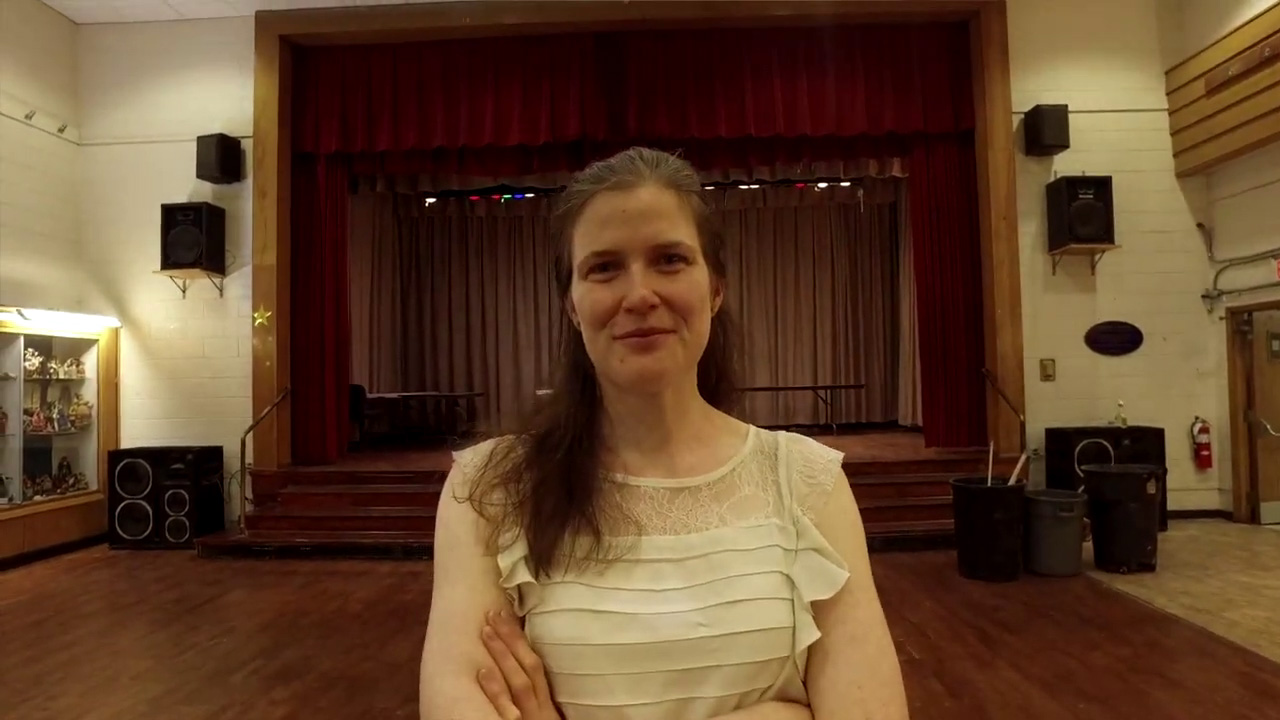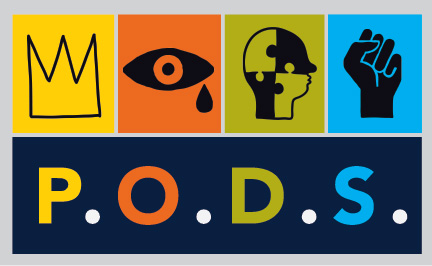
Kaity Nicastri, MSW '10, shares her story working at the International Institute, in Detroit, Michigan working on family and humanitarian based applications.
Watch the video.
Global Social Work Practice
The Global Social Work Pathway is for those social work students interested in dedicating themselves to global issues. The pathway addresses topics, such as migration, displacement, poverty, climate change, indigeneity, etc. from a perspective that recognizes an imbalance of power and cultural differences within a global context.
Students will engage with culturally diverse communities, domestically and abroad; they will become part of a global community of social workers who use their knowledge, skills, and values to work with communities in promoting social change, empowerment and supporting the liberation of people.
Students will develop a critical understanding of how their own assumptions, values, biases, positionalities (gender expression, age, race/ethnicity, etc.) affect their practice of global social work. Students will examine issues of power, privilege, oppression, social justice, and the processes and impact of the global capitalist project - acts of war, colonization, extraction, international aid and development, and democratization.
Implications for global social work policy and practice will be explored by evaluating programs and policies, co-developing training with agencies in international settings, advocating and organizing in collaboration with diverse communities, and by participating in field-based projects, global independent studies, and courses and lectures by local and international experts, community leaders and practitioners.
Pathway Practice Scope & Clinical Licensure
Students interested in pursuing social work clinical licensure in the United States of America are recommended to select a primary pathway that focuses on direct, interpersonal practice such as 1) Interpersonal Practice in Integrated Health, Mental Health, & Substance Abuse, 2) Children, Youth and Families (formerly Welfare of Children and Families), or 3) Social Work Practice with Older Adults and Families from a Lifespan Perspective and the Global Social Work Practice pathway as their secondary pathway.
For more information on licensure, please visit the Professional Licensing and Exam Preparation website.
Careers
Examples of career (job) titles and positions relevant to this pathway include but are not limited to:
- Academic Advisor/Student Affairs Advisor (provide international student support)
- Capacity Building Specialist
- Case Manager (resettlement and immigration)
- International Family Development Specialist (i.e. international adoption)
- International Development Worker
- Health Educator
- Human Rights Advocate
- Policy Advisor
- Program Assistant (international or research grants)
- Program Development (international or research grants)
- State Department or U.S. Embassy Worker
- Study Abroad Program Manager
Field Experience
Types of agencies and settings where students in this pathway may engage in field learning:
- Michigan-based placements that focus on global issues/populations
- National based placements that focus on global issues/populations
- Field placements outside the US with U-M partners
Global Opportunities
Global Field Placements
Global field placements offer students who are committed to global social work in the Advanced Standing, MasterTrack MSW, or out-of-sequence, 16-month curriculum track the opportunity to complete a spring/summer field placement in a global location. The Office of Global Activities also works with the Office of Field Education to provide domestic field placements that address cross-cultural and global social work issues. If you are interested in a field placement outside the U.S., please make sure to reach out to the Office of Global Activities by emailing [email protected].
Learn more about global field placements »
Global Independent Study
The global independent study option offers students in all curriculum tracks the opportunity to work with a social work faculty sponsor to develop a project to explore or research a particular social work issue in a global context. Travel occurs during the spring/summer term.
Learn more about global independent study »
Peace Corps
The Masters International Volunteer Program offers 20-month and advance standing students in any practice area or concentration the opportunity to incorporate 27 months of Peace Corps service into their MSW program. The Peace Corps Coverdell Fellows Program provides Returned Peace Corps Volunteers the opportunity to earn a Master in Social Work at the University of Michigan.
Program Details
Global Social Work Practice Pathway Course Requirements
Essentials
- SW505: Engaging Social Justice, Diversity, and Oppression in Social Work, 3 credits
- SW506: Essentials of Interpersonal Practice, 4 credits
- SW507: Research Basics for Social Work Practice, 1 credits
- SW508: Essentials of Social Welfare Policy, 3 credits
- SW509: Essentials of Community and Organizational Practice, 3 credits
- SW590: Introduction to Social Work Practice, 1 credits
- SW649: Practicing Policy with Current Events, 1 credits
- SW678: Program Evaluation and Applied Research, 3 credits
- SW699: Social Work Capstone, 1 credits
Pathway Requirement
- SW680: Power in the Global Context, 3 credits
- SW681: Critical Reflexive Global Practices, 3 credits
Please see course planning worksheets for a full list of courses associated with this pathway.
Students enrolled in the Global Social Work Practice pathway may take language courses to fulfill 3 credits of the Global Social Work Practice Pathway Required Electives (SWrGL). If you want to use a language course toward the SWrGL requirement, you will need to fill out a course substitution to receive approval. In the "Rationale for Substitution" box you should reference this page. SSW students may apply up to 4 graduate-level language credits toward their MSW degree.
For other courses that can meet the pathway elective requirement, please see the Outside Courses tab.
Please make sure to read the Graduate Credit for Language Courses page in its entirety for important information about how language credits are applied towards the MSW degree.
Language courses can be taken at the undergraduate or graduate level through the College of Literature, Science and the Arts (LSA) and its various language and culture departments or the Residential College. A list of languages offered at U-M through LSA and their affiliated departments is included here for your reference. To view a list of associated course numbers please refer to the LSA Language Requirement webpage.
If you are interested in further developing language skills but not necessarily for credit, or if the language you are interested in developing is not offered through a U-M department, the U-M Language Resource Center provides resources to support language learners on campus, including language tutors, workshops, and access to various international print and media.
The graduate courses listed below have been taken by previous MSW students or have been identified as being of possible interest to students in this pathway and can be taken to fulfill Pathway Required Electives. On the course planning worksheet, information regarding Pathway Required Electives is included.
There are many other courses not listed below that may be of interest and may also meet the elective requirement. If you identify a pathway-related course not listed below that you want to take to meet your Pathway Required Electives (rather than simply an elective), please contact the Technical Advisors ([email protected]) for approval.
Interest in courses numbered below 500 should be checked for graduate-level status since many are offered for undergraduate credit only. You can check this by contacting the department offering the course or contacting the SSW registrar ([email protected]).
In addition, some courses may be restricted, require prerequisites, not be open to social work students, and/or require instructor permission. If you encounter problems registering for these courses, please contact the department offering the course. The SSW registrar will not be able to assist with registration in outside courses because these courses are not offered by the SSW.
The courses listed below are offered in various semesters. To see if a course is offered in the term you are interested please check the SSW list of outside courses, the website of the department offering the course, or the Wolverine Access Class Search page.
If you want to use one of these non-School of Social Work courses to fulfill the Global Social Work Practice Pathway Required Electives (SWrGL), you will need to fill out a course substitution to receive approval. In the "Rationale for Substitution" box you should reference this page.
Please also see the note on the Language Courses tab about language courses that can be taken as Global Social Work Practice pathway electives.
Afroamerican & African Studies
- CAAS 443 - Race, Gender & Health
Education
- EDUC 644 - Comparative and International Education
Health Behavior & Health Education
- HBEHED 617 - Global Public Health
- HBEHED 624 - Need Assessment Methods for Behavioral and Educational Health Programs
- HBEHED 677 - Health Impacts Of Immigration Law Enforcement In The U.S.
Health Management & Policy
- HMP 677 - Health Care Organization: An International Perspective
Law
Nursing
Political Science
- POLSCI 672 - International Peace and Security Affairs
Public Health
- PUBHLTH 554 - Applications In Global Public Health
Public Policy
- PUBPOL 534 - Economics of Developing Countries
- PUBPOL 541 - International Trade Policy
- PUBPOL 675 - Human Rights and International Policy
- PUBPOL 717 - Social Activism, Democracy & Globalization: Perspective of the Global South
- PUBPOL 763 - Global Issues: Drugs, Crime, and Terrorism
Ross School of Business, Business Administration
- BA 620 - A Cross-Disciplinary Perspective on Healthcare Delivery in Low- and Middle-Income Countries
Ross School of Business, Strategy
- STRATEGY 562 - Innovation in Global Health Delivery
Sociology
- SOC 503 - Race, Ethnicity, and Immigration
- SOC 555 - Culture & Knowledge
Women's Studies
- WOMENSTD 435 - Advanced Topics in Gender in a Global Context
- WOMENSTD 496 - Gender and Representation in the Modern Middle East
Competencies for Global Social Work Practice
University of Michigan's School of Social Work (U-M SSW) is accredited by the Commission on Accreditation (COA), of the Council on Social Work Education (CSWE). Accreditation is a system of recognizing educational programs as having a level of performance and quality that gain them the confidence of the educational community and the public. You can read more about the Educational Policy and Accreditation Standards here.
At U-M SSW, each pathway has specialized competencies that describe the knowledge, values, skills, and cognitive and affective processes that comprise the competency in each pathway area.
1. Demonstrate Ethical and Professional Behavior
Social workers demonstrate the ability to apply ethical social work principles and critical thinking to products and work produced. Social workers understand the role of emotional intelligence and professional resilience in professional and ethical practice. Social workers understand the role of other professionals when engaged in interprofessional teams within their areas of specialization. Social workers recognize the importance of life-long learning and ways that supervision and consultation can support continued development.
Practice Behaviors:
- Utilize supervision and consultation to guide professional decision-making.
- Demonstrate emotional intelligence in practice and professional situations.
- Utilize effective communication strategies appropriate to context.
- Utilize supervision and consultation to guide professional decision-making
- Demonstrate emotional intelligence in practice and professional situations
- Utilize effective communication strategies appropriate to context
2. Engage Diversity and Difference in Practice
Social workers engage with culturally diverse communities, domestically and abroad, to promote social change, empowerment and supporting the liberation of people. Social workers work to engage diversity and difference in practice as well as work with and on behalf of constituents to challenge discrimination and work against institutionalized oppression of all forms. Social workers recognize the ways an imbalance of power and cultural differences within a global context impact individuals, communities, and societies.
Practice Behaviors:
- Develop awareness of one’s own social identities and the impact of those identities on global work.
- Learn to engage with and across diverse populations within a global context.
- Identify systems of power, privilege, and oppression in global social work.
- Identify factors and issues that may affect inequity and marginalization within different socio-political, economic and cultural structures and conventions.
- Demonstrate an awareness of the effects of current and historical oppression, discrimination, and trauma on client and client systems
- Serve as mediators to enable consensus building and advocate for the rights of marginalized, stigmatized, excluded, exploited, and oppressed individuals, communities, and societies
- Engage in practices that advance human rights and, social, racial, economic, and environmental justice
3. Advance Human Rights and Social, Economic, and Environmental Justice
Social workers respect, promote, and defend the fundamental and inalienable rights of all human beings as reflected in the Universal Declaration of Human RIghts and other human rights instruments and conventions (e.g. indivisibility, freedom, safety, privacy, an adequate standard of living, health care, and education). Student will identify disparities in resources and services and learn the global interconnections of oppression and human rights violations. Social workers be knowledgeable about the structure, dynamics, and theories of human needs, justice, and relations of power in organizations, social service networks, and communities within a global context. Social workers apply strategies to protect all civil, political, economic, social, cultural, and environmental rights and create reciprocal relationships within global communities.
Practice Behaviors:
- Demonstrate an awareness of the effects of current and historical oppression, discrimination, and trauma on client and client systems.
- Serve as mediators to enable consensus building and advocate for the rights of marginalized, stigmatized, excluded, exploited and oppressed individuals, communities, and societies.
- Engage in practices that advance human rights, social, economic, and environmental justice.
- Develop awareness of one’s own social identities and the impact of those identities on global work
- Learn to engage with and across diverse populations within a global context
- Identify systems of power, privilege, and oppression in global social work that lead to racial inequity and marginalization within communities and society
- Identify factors and issues that may affect inequity and marginalization within different socio-political, economic and cultural structures and conventions
4. Engage in Practice-informed Research and Research-informed Practice
Social workers understand how to critically evaluate, analyze, and apply available research, professional articles, and evidence related to social issues and interventions in their global social work practice. Social workers develop reflexive skills in research design, data analysis, and knowledge dissemination. In addition, they will learn to seek supervision, consultation, and apply self-evaluation to improve their learning and practice.
Practice Behaviors:
- Learn best practices and frameworks to develop and implement community, organizational, and/or policy interventions in a global context.
- Apply critical and reflexive thinking to quantitative and qualitative research methods and findings.
- Use research-based knowledge to inform global social work.
- Learn best practices and frameworks to develop and implement community, organizational, and/or policy interventions in a global context
- Apply critical and reflexive thinking to quantitative and qualitative research methods and findings
- Use research-based knowledge to inform global social work practice
5. Engage in Policy Practice
Social workers understand how to analyze, formulate, and advocate for policies that advance human rights and social, economic, and/or environmental justice through the application of critical thinking skills. Social workers are able to identify how current events are linked to policy issues, how to critically analyze and understand policy implications, and apply strategies to engage in policy practice that effect change and advocate for clients.
Practice Behaviors:
- Identify how current events are linked to policy issues impacting clients and client systems.
- Analyze the implications of policy across service systems.
- Identify strategies to engage with policy to advocate for clients and client systems.
- Identify how current events are linked to policy issues impacting clients and client systems
- Analyze the implications of policy across service systems
- Identify strategies to engage with policy to advocate for clients and client systems
6. Engage with Individuals, Families, Groups, Organizations, and Communities
Social workers understand that engagement within, across, and on behalf of different cultural, geopolitical, socio-economic, organizational, and interpersonal settings is an ongoing component of global social work practice. They will understand the importance of reciprocal relationships within communities and the responsibilities of every human for each other and the environment.
Practice Behaviors:
- Learn strategies for developing empathetic professional relationship-building within and across diverse stakeholder groups and contexts.
- Identify strengths and inherent dignity of all human beings.
- Reflect on how one’s own personal social identities impact practice.
- Develop capacity to critically examine models and frameworks used to guide decision-making community-focused and participatory process.
- Learn strategies for developing empathetic professional relationship-building within and across diverse stakeholder groups and contexts
- Identify strengths and inherent dignity of all human beings
- Reflect on how one’s own personal social identities impact practice
- Develop capacity to critically examine models and frameworks used to guide decision-making community-focused and participatory process
7. Assess Individuals, Families, Groups, Organizations, and Communities
Social workers understand the importance of assessment within global social work. Social workers learn to conduct needs assessments and plan participatory interventions with individuals, families, groups, communities, and systems of care. Social workers critically examine assessment practices to challenge bias and inequities. They will learn to develop alternative, anti-oppressive approaches that improve assessment processes.
Practice Behaviors:
- Develop skills to collect, organize, and analyze information from stakeholders.
- Learn strategies to conduct participatory individual, family, group, organization, and community assessments.
- Apply critical thinking to select, develop, and integrate interventions based on assessment research knowledge, culturally informed values.
- Develop skills to collect, organize, and analyze information from stakeholders
- Learn strategies to conduct participatory individual, family, group, organization, and community assessments
- Apply critical thinking to select, develop, and integrate interventions based on assessment, research knowledge, and culturally informed values
8. Intervene with Individuals, Families, Groups, Organizations, and Communities
Social workers understand the importance of interventions that promote social justice within a global context. Social workers learn skills to conduct community-engaged service plans including intake, referral, monitoring, assessment, and remediation strategies. Social workers critically examine service delivery practices and related strategies and tactics to explore bias. Social workers learn to examine, implement and assess alternative, anti-oppressive approaches.
Practice Behaviors:
- Develop skills for conducting and facilitating participatory interventions within and across cultural, geopolitical, socio-economic, organizational, and interpersonal settings.
- Learn strategies to engage, support, and provide information to stakeholders in advocacy processes.
- Apply reflexive thinking to select, develop, and integrate appropriate interventions.
- Develop skills for conducting and facilitating participatory interventions within and across cultural, geopolitical, socio-economic, organizational, and interpersonal settings
- Learn strategies to engage, support, and provide information to stakeholders in advocacy processes
- Apply reflexive thinking to select, develop, and integrate appropriate interventions
9. Evaluate Practice with Individuals, Families, Groups, Organizations, and Communities
Social workers understand the importance of evaluating and challenging practices within a global context. Social workers learn skills to conduct community-based participatory research and evaluations. Social workers critically examine research design practices and related strategies and tactics to explore bias. Social workers learn to examine, implement and assess alternative, anti-oppressive community-based participation designs.
Practice Behaviors:
- Develop skills to evaluate, analyze, and monitor interventions and best practices within programs, organizations, communities, and social systems.
- Learn strategies to advocate on behalf of issues regarding inadequate, oppressive, or inequitable policies and practices.
- Apply evaluation findings to improve practice within and across different cultural, geopolitical, socio-economic, organizational, and interpersonal settings.
- Develop skills to evaluate, analyze, and monitor interventions and best practices within programs, organizations, communities, and social systems
- Learn strategies to advocate on behalf of issues regarding inadequate, oppressive, racist, or inequitable policies and practices
- Apply evaluation findings to improve practice within and across different cultural, geopolitical, socio-economic, organizational, and interpersonal settings






